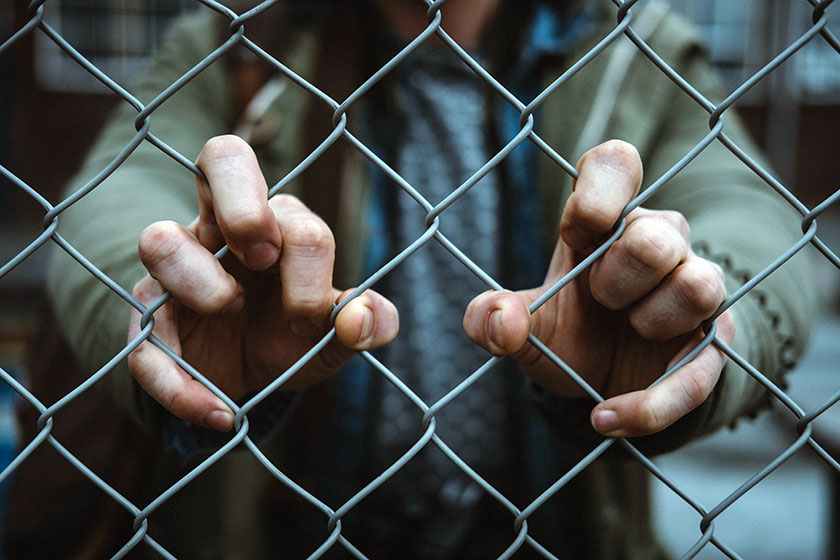What makes prisoners more likely to commit another crime when they get out of prison?
What makes prisoners more likely to commit another crime when they get out of prison?
Is it the lack of a job? Hanging around with friends from the "old neighborhood?" Low self-esteem?

CRIMINOGENIC NEEDS
Quite a bit of research has been done to identify criminogenic needs—a tongue-twister of a phrase that refers to major risk factors highly associated with criminal conduct.
Let's look at each factor in more detail. Then we will consider how Prison Fellowship® volunteers can help address these needs.
ANTISOCIAL VALUES AND BELIEFS
Incarcerated men and women generally exhibit certain thinking errors that affect how they interpret and process information. These errors include a sense of entitlement, self-justification, blaming others, unrealistic perceptions of reality, and taking on a "victim stance" (for example, "the system is out to get me"). They often misinterpret benign behaviors or harmless remarks as threats ("he disrespected me"). And they confuse wants with needs.
ANTISOCIAL PEERS
Associating primarily with friends involved in criminal behavior puts one at high risk of sharing in that behavior. Over time, the incarcerated person loses contact with "prosocial" people, and then has no social support network to help reinforce appropriate behaviors. In fact, research indicates that a person's companions may actually be the greatest predictor of criminal behavior. However, prisoners often deny the influence of others on their lives, as that would threaten their sense of autonomy. They fancy themselves as leaders, not followers.
PERSONALITY TRAITS
Some prisoners have what could be legitimately diagnosed as an antisocial personality disorder. They are habitually deceitful, irresponsible, aggressive, violent, and impulsive; they fail to conform to social norms and laws, show reckless disregard for others' safety, and experience little or no remorse for their mistreatment of others. Any of these traits can steer a person toward criminal conduct.
FAMILY DYSFUNCTION
People first learn attitudes, values, and behaviors within the context of the family. Broken families, abusive or neglectful relationships, permissiveness, family members involved in drug or alcohol abuse or criminal activities—these and other unhealthy family factors typically contribute to individuals' negative, harmful ways of thinking and acting.
LOW SELF-CONTROL
People who commit crimes often have a history of impulsive, risk-taking behavior. Those with low self-control are easily persuaded by situational and environmental factors. If they lack healthy attachments (to positive friends, family, employment, etc.), there is little to constrain them from risky or criminal behavior.
SUBSTANCE ABUSE
The risk of criminal behavior rises with the degree of dependency on drugs and level of use. Some are true addicts; others are "dabblers," whose use of drugs may be related more to opportunity than to compulsion. Still others are in-between.

FACTORS THAT DO NOT HEIGHTEN THE RISK OF RECIDIVISM
Equally important is being aware of the factors not included in the list of criminogenic factors—which means these factors do not generally predict a high risk of returning to crime:
- Low self-esteem
- Mental-health issues
- Low education status
- Lack of employment options
Interestingly, these are the kind of factors that many reentry programs target. Certainly any of these areas can cause a strain on a person's life and relationships. But if programs and support networks focus only on these issues without addressing the criminogenic needs, research shows they will have little effect on recidivism. Getting a job, for example, is essential for a formerly incarcerated person to take care of his family and become a productive, contributing member of society. But if his antisocial, self-centered attitudes stir up conflicts with his employer and other workers, he'll soon be kicked to the curb.

HOW PRISON FELLOWSHIP IS CHANGING LIVES
Prison Fellowship is working behind bars to address the underlying risk factors that contribute to people committing new crimes after they are released from prison. Through a variety of in-prison programs, Prison Fellowship is building a prosocial community that focuses on the prisoners' restoration and thriving future beyond the prison walls.
Prison Fellowship Academies are the cornerstone of our efforts to transform prisoners' thinking, values, and behaviors.
PRISON FELLOWSHIP ACADEMY®
Located in select prisons across the country, Prison Fellowship Academies take incarcerated men and women through a holistic life transformation spanning weeks or months, where they are guided by Prison Fellowship staff and volunteers to lead lives of purpose and productivity inside and outside of prison.
The Academy specifically targets criminal thinking and behavior, life skills, addictions, victim impact, and prosocial culture change, with the goal of developing prisoners who have leadership potential to serve as positive peer mentors and supporters of constructive prison culture throughout prison systems. Those who complete the program and are preparing for release will have the opportunity to connect to post-release resources and support in metropolitan areas.
TUMI
Prison Fellowship also offers The Urban Ministry Institute (TUMI), an intensive theological training course. Offered in conjunction with World Impact, TUMI teaches and equips prisoners to become Christian leaders in prisons and in the urban communities to which many of them will return.
Launched in prisons in 2007, TUMI is currently active in 10 states and 41 prisons, both male and female, with more than 1,100 current participants. Graduates of the program have both been recognized as leaders in their respective institutions and have made positive transitions back into their communities as spouses, parents, employees, and urban missionaries.
CELEBRATE RECOVERY
Prison Fellowship has launched a new partnership with Celebrate Recovery. Celebrate Recovery has designed its program to help people overcome hurts, hang-ups, and habits. In the last seven years, more than 175,000 prisoners have completed a year-long Celebrate Recovery program.
Bringing this program to incarcerated men and women struggling with an addiction is a natural extension of Prison Fellowship's goal to see prisoners use their sentences as a time to grow, change, and find a new, positive life path while incarcerated. Celebrate Recovery will be part of the curriculum for every Prison Fellowship Academy, as it can serve anyone struggling with a life-controlling issue.
YOU ARE MAKING A HUGE DIFFERENCE!
Whatever your role as a Prison Fellowship volunteer, you are having an important influence in transforming prisoners' lives and reducing their risk of returning to crime. Keep these criminogenic needs
in mind as you continue to lead Bible studies, teach seminars and classes, mentor, or support prisoners, returning citizens, and their families in other ways. You are making a lasting difference!
Download and share these criminogenic needs.